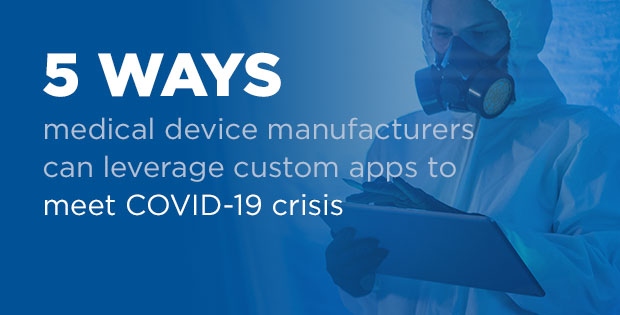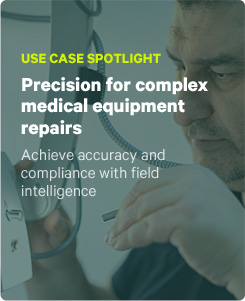
Global pandemics create a surge of new patients in healthcare facilities—clinics and hospitals— that completely overwhelm its staff and operations. We’re now witnessing this crisis with COVID-19 in Europe and it’s an emergency now looming in America.
The most vulnerable of COVID-19 patients require access to medical ventilators in order to stay alive. The rapid spread has led to a medical device shortage to treat those in the advanced stages of coronavirus. The sad consequence is that doctors have to make the hardest choice imaginable: which patients to treat with the available medical ventilators and which ones to make wait and hope for a miracle.
To combat the shortage, large scale orders of the required medical devices have been placed by federal, state and private healthcare facilities. Not only do these facilities need the equipment yesterday, they need it installed and operational immediately. Therein lies the challenge: medical device installations, particularly medical ventilator installations, follow very sophisticated protocol, require oxygen connections, standard and backup power systems. The installations must also, of course, meet compliance specifications.
How do medical device manufacturers respond to this unprecedented healthcare crisis? What can they do to ensure they rapidly deploy, install and maintain these complex pieces of equipment in a predictable and reliable way? Time is of the essence.
A custom applications platform designed for field service can help overcome these challenges. All large medical device manufacturers have basic technician dispatching and service systems, but the majority of these systems were designed before the existence of mobile apps—the more contemporary dispatching systems have rudimentary apps. This results in complex installation and maintenance protocols that are paper-based, require extensive and lengthy technician training, and are not scalable to contract workers or rapidly expanded work teams in times of crisis.
A Low Code Application Platform (LCAP)—as coined by Gartner—empowers an organization to build simple-to-use apps without developers. A medical device company can take control of its own app design and building and leverage their detailed knowledge of device installation procedures and compliance to create detailed step-by-step apps for unique device installation workflows. Utilizing these apps, companies can rapidly enable large volumes of technicians to reliably handle complex tasks for installation, empowering them to reallocate technicians from other duties and focus priorities and efforts on equipment related to a crisis response.
The digital workflows generated by custom mobile apps close the gaps created by paper-based workflows. They step up in a big way to the challenge of a COVID-19 pandemic through:
- Safety of technicians
- Speed of response
- Scale of response
- Compliance
- Quality of actionable data

Safety of technicians
The world has changed in 2020. The reality is the highly contagious nature of coronavirus means that field technicians employed by medical device companies will work in hot zones to perform installation and maintenance of medical equipment.
We’re learning more about coronavirus every day. As a result, there are several sophisticated, new and rapidly evolving protocols for performing work in these situations. LCAP makes it easy to institute same-day changes that reflect the newest protocols to apps and deploy them right back to the field in minutes. This helps reduce threats to your field force because it enables you to make the most up-to-date safety protocols available to your techs as part of guided step-by-step work processes at all times.
It’s of paramount importance that companies take whatever measures they can to ensure technicians work safely and stay healthy. If a technician becomes symptomatic and has to self-isolate, it will impact the ability to respond to this crisis. The app itself can become a vital tool to the technician because it can direct them to what company health guideline steps, they need to follow to report their illness and seek care should they fall ill.
Speed of response
Pandemics dramatically increase the importance of speed of response. Medical facilities are desperate for additional equipment to respond—or prepare for—a crisis. The ability for a field technician to perform these new installations rapidly is of the utmost importance.
Much in the way same that patient care facilities need more equipment, the field technicians tasked with its installation and maintenance need better tools to ensure their work is done quickly and reliably. LCAP is that better tool.
Traditional app building can take months, sometimes years. With LCAP, an organization can get the apps built, tested and deployed to thousands of workers in days.
To understand the size of the challenge—a recent New York Times article posited that the state of New York may require 18,000 new medical ventilators. That’s just one state. COVID-19 has impacted all fifty.
Scale of response
The number infected by the COVID-19 pandemic are scaling at dire trajectory. Medical device manufacturers need to explore new methods that can scale to meet the crisis. The only way to deploy a new tool to thousands of technicians rapidly is if that tool offers a simple UX that’s easy to adopt and requires little to no formal training. The apps should be easier to use than Facebook.
Low code apps enable organizations to provide contextual guided step-by-step installation instructions that lead techs through complex scenarios and enable them to do their work more efficiently and precisely.
Compounding the challenge of reassigning technicians to focus on specific equipment installations is the reality that some could fall victim to the disease and require quarantine or self-isolation. This will require rapid onboarding of additional contract technicians who may be less familiar with unique installation processes. The guided contextual apps once again become a relevant enabler to meet objectives.
Compliance
The medical industry has strict compliance guidelines for medical equipment installation, maintenance and service that are fundamental for patient safety and asset uptime. And just like new protocols for worker safety are the new reality, there could be evolving compliance regulations related to equipment installations and maintenance.
LCAP solutions make it easy to build fully customized apps that will keep up with these evolving compliance regulations for health, safety and quality processes responding to the COVID-19 crisis. In addition, LCAP solutions can auto-create forms, documents and reports required for compliance reporting and append them to work records or route them via workflows to stakeholders and regulatory authorities. ?
Just as importantly, many of these platforms are capable of supporting work in these environments and meeting strict security and privacy requirements; HIPAA compliant, HITECH compliant, SOC 2 Type II compliant, and Title 21 CFR Part 11 compliant.
Quality of actionable data
The best custom app platforms have powerful analytics that keep executives and stakeholders in the know with easy to understand dashboards. These rapid and deep insights give organizations immediate actionable data that can help decision makers focus and reallocate precious resources where they’re most required.
These powerful and actionable dashboards—including those for asset compliance, asset maintenance or service requirements, worker productivity, worker health and safety compliance and more?—provide real-time visibility into the field that is key to a COVID-19 crisis response. Imagine trying to achieve the same in a rapid and reliable way via paper-based non-digital workflows.
Every moment counts
For the sake of improving patient survival rates, blunting the impacts of this pandemic, and ensuring field technician safety, it’s imperative medical device manufacturers look at all technology solutions that can help accelerate a response to this crisis.
On Friday, April 3 at 1:00 pm EST, John Carroll from Service Council, Lenny Cumberledge from Purell, and Mark Scott from ProntoForms will be holding a webinar to discuss how field service organizations are addressing this particular crisis.
Join us to learn more about the topics and register here: Responding to the Pandemic: 5 Guiding Principles for Field Service Leaders




